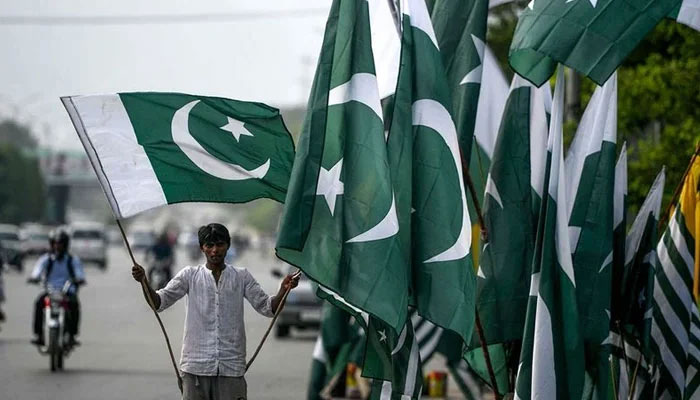The roots of Pakistan
Pre-British Hindustan was truly a kaleidoscope of multiple outlooks
The lived experience of Muslims participating and in some places leading the near impromptu uprising in 1857 against the British in the Subcontinent reflected Muslim passion, anger, reactiveness, assertion, confidence and courage.
These traits were significant but indeed insufficient to defeat the British East India Company which controlled India with the help of around 50,000 British and around 300,000 local soldiers.
The war did emphasize the faultlines of diverse cultural and religious orientations, between the colonizers and the colonized and also among people from different races and religions, specifically of their respective historical past as well the more recent political past.
Within sections of the Muslims, many saw themselves as having been rulers for centuries who were now being replaced by the British. Among non-Muslims, many saw the beginnings of British rule as the end of centuries of unjust Muslim rule.
It would, however, be factually incorrect to assert any sweeping generalizations regarding all the Muslims, Hindus, Sikhs, Christians etc living across the hundreds of states that constituted mostly administratively separate units in the Subcontinent. These separate units were first pulled together gradually as a united unit when the British began to rule India. There was no united India before the British arrived and also no single religious group of people with a shared uniform political outlook.
Pre-British Hindustan was truly a kaleidoscope of multiple outlooks. Battles and friendships were not on religious lines but on the basis of the respective state’s interests. There was though always a single dominant power centre that all other smaller states generally accepted as the primary or the central rulers.
The significant impact of the war of independence, in which both Muslims and Hindus participated, was the British identifying the Muslims as the primary targets to be subordinated.
The subsequent history of British colonialism is replete with examples of how the British aligned with the Congress leadership in contrast with their reticent if not brash engagement with the Muslim leadership.
The foundational thinking and strategy on this partisan British approach towards the Muslims is best documented in W W Hunters book, ‘The Indian Musalmans’. Hunter outlines in the most blatant terms the ‘threat’ the British felt from the Muslims of India who the author believed refused to surrender their glorious past as rulers and accept the domination of another people.
Hunter’s Hitler-like prescription to subjugate the Muslims is an embarrassing read for any civilized person. It is also a must-read for an understanding of what framed a prejudiced British attitude against the Muslim leadership in colonial India.
This book also outlined the gigantic challenge that the Muslims of not just India would face in the decades that followed but which were also faced by the post-independence Pakistan.
Perhaps Sir Syed Ahmad Khan was a great response to Hunter – in how he urged the Muslims of India that education was their best ally in confronting the challenges of colonialism.
Subsequently, in Mohammad Ali Jinnah – Pakistan’s founding father – Muslims found the best, the most brilliant sole advocate and strategist who pushed back in the most civilized and constitutionalist way against the prejudice of the Mountbattens and the Nehrus to win Pakistan.
In Pakistan the unmet challenges are mounting, our key challenges being genuine rule of law, adherence to the constitution and equality for all Pakistanis within the constitutional framework.
The writer is a senior journalist. She tweets at @nasimzehra and can be reached at: nasimzehra@gmail.com
-
 Apple Sued Over 'child Sexual Abuse' Material Stored Or Shared On ICloud
Apple Sued Over 'child Sexual Abuse' Material Stored Or Shared On ICloud -
 Nancy Guthrie Kidnapped With 'blessings' Of Drug Cartels
Nancy Guthrie Kidnapped With 'blessings' Of Drug Cartels -
 Hailey Bieber Reveals Justin Bieber's Hit Song Baby Jack Is Already Singing
Hailey Bieber Reveals Justin Bieber's Hit Song Baby Jack Is Already Singing -
 Emily Ratajkowski Appears To Confirm Romance With Dua Lipa's Ex Romain Gavras
Emily Ratajkowski Appears To Confirm Romance With Dua Lipa's Ex Romain Gavras -
 Leighton Meester Breaks Silence On Viral Ariana Grande Interaction On Critics Choice Awards
Leighton Meester Breaks Silence On Viral Ariana Grande Interaction On Critics Choice Awards -
 Heavy Snowfall Disrupts Operations At Germany's Largest Airport
Heavy Snowfall Disrupts Operations At Germany's Largest Airport -
 Andrew Mountbatten Windsor Released Hours After Police Arrest
Andrew Mountbatten Windsor Released Hours After Police Arrest -
 Heidi Klum Eyes Spooky Season Anthem With Diplo After Being Dubbed 'Queen Of Halloween'
Heidi Klum Eyes Spooky Season Anthem With Diplo After Being Dubbed 'Queen Of Halloween' -
 King Charles Is In ‘unchartered Waters’ As Andrew Takes Family Down
King Charles Is In ‘unchartered Waters’ As Andrew Takes Family Down -
 Why Prince Harry, Meghan 'immensely' Feel 'relieved' Amid Andrew's Arrest?
Why Prince Harry, Meghan 'immensely' Feel 'relieved' Amid Andrew's Arrest? -
 Jennifer Aniston’s Boyfriend Jim Curtis Hints At Tensions At Home, Reveals Rules To Survive Fights
Jennifer Aniston’s Boyfriend Jim Curtis Hints At Tensions At Home, Reveals Rules To Survive Fights -
 Shamed Andrew ‘dismissive’ Act Towards Royal Butler Exposed
Shamed Andrew ‘dismissive’ Act Towards Royal Butler Exposed -
 Hailey Bieber Shares How She Protects Her Mental Health While Facing Endless Criticism
Hailey Bieber Shares How She Protects Her Mental Health While Facing Endless Criticism -
 Queen Elizabeth II Saw ‘qualities Of Future Queen’ In Kate Middleton
Queen Elizabeth II Saw ‘qualities Of Future Queen’ In Kate Middleton -
 Amanda Seyfried Shares Hilarious Reaction To Discovering Second Job On 'Housemaid': 'Didn’t Sign Up For That'
Amanda Seyfried Shares Hilarious Reaction To Discovering Second Job On 'Housemaid': 'Didn’t Sign Up For That' -
 Hilary Duff Reveals Deep Fear About Matthew Koma Marriage
Hilary Duff Reveals Deep Fear About Matthew Koma Marriage




